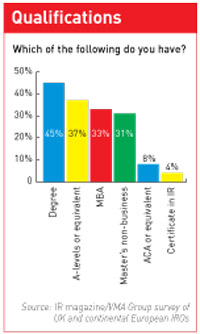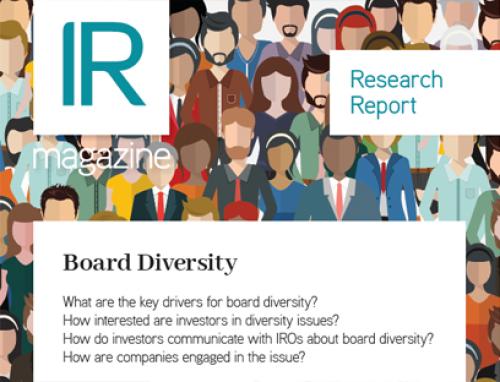Recruitment consultants and IROs talk about the hottest jobs going and how to get them
While the volatile economy has some job-seeking IROs in the major economies sitting tight, opportunity is ripe in other markets around the world – and recruiters say experienced professionals should start to realize that demand for their skills is global.
‘Where there are good jobs is where there is a source of capital,’ says David Mounde, managing director in London for the executive search firm Deverill. ‘The UK and the US are quite mature as markets and, with the credit crunch, I think we’ll see their skills exported, particularly to the Middle East.’
IROs in Europe and North America have spent years developing and perfecting financial communications; newer markets are now looking to draw on that experience. Mounde notes the recent move of a leading London-based investment banking IRO to a communications role with Abu Dhabi’s sovereign wealth fund. Listed companies throughout the Arab region are looking to take a ‘seismic step’ in their IR, skipping the painful phase of growing their own talent from scratch, he says: ‘They want to draft talent straight in.’
Kate Dowman, associate director with search consultants VMA Group, says she recently helped two Dubai companies recruit new people and found herself ‘inundated’ with applications from the US and UK. She says companies seem determined to develop credible IR. ‘One client wanted to set a precedent in the sector,’ she notes. ‘The financial director said, I want to be a leader as far as IR goes, and I want to do it first.’
This development is having knock-on effects for IROs outside the most expensive hiring markets. Mounde says he sees Middle Eastern companies noting the large pay packages in the US and Europe and looking ‘to pull talent from South Africa at a cheaper rate.’
Another emerging market for IROs is China, where publicly traded companies are trying to raise their profile on the world stage, says TT Ho, client-partner in Korn/Ferry’s Hong Kong office. ‘IR is hot in Asia right now; there are thousands of publicly listed companies in Greater China alone,’ he explains. ‘Many of these companies would like to be better known and covered.’IRO to CFO?
While the job market for the most intrepid IROs looks vibrant, those who stay in their home markets aren’t faring badly, either. A new NIRI-Korn/Ferry International study finds US IROs are playing an increasingly important role in publicly traded companies, with four out of five reporting directly to the C-suite, either to the CFO or CEO. Many compensation packages at top companies, including base salary, bonuses and long-term incentives, are also solidly in the $300,000 range, the study says. Mounde says the UK market pays similarly.
The stature of IROs is increasing, too, as their skills and well-rounded nature make them more adept at handling complex business and legal environments. Some top IROs are even being groomed to take up residence in the C-suite, though that progression is still rare, says Smooch Repovich Reynolds, principal of the Repovich-Reynolds Group in Pasadena, California. ‘There are many myths in the marketplace leading people to believe that with certain titles come certain privileges, like automatic passage to the C-suite,’ she says. ‘It really depends on the individual, however – it’s a combination of textbook skills and executive presence.’
Sought-after positions
Aiming for a spot at one of the large-cap Fortune 500 companies usually means fatter compensation, and can be a way for IROs at smaller companies to progress if they don’t feel they’re headed for the C-suite where they are. The NIRI study finds moving to larger companies with more analyst coverage and potentially more diverse shareholder populations is one way to move up another rung.
In the UK and throughout Europe, a top IR post is likely to be a pure communications function, says Leila Reuter, a senior IR consultant with London-based recruitment company Taylor Bennett. The position is still sought after, but there are few IR professionals making the jump to the highest management levels, although that did happen at Vodafone Group and Intercontinental Hotels & Resorts, Reuter adds.
‘IR is an entry point into a company, but in order to make it to the C-suite you still have to prove yourself ,’ Reuter explains. ‘You probably need an accountancy or strong financial background to move up and have the credibility for the executive roles.’
She adds that while demand for IROs in Europe lags behind the US, there is still a good market for positions at the top listed companies. Many candidates she interviews are seeking positions with media, retail or consumer products companies, and candidates with telecommunications or financial services experience are in demand.
Australia is another country where the progression from IRO to CFO or CEO is uncommon, says Australasian Investor Relations Association CEO Ian Matheson, because IR is seen more as a communications role than a finance role in that market. The jobs most in demand there are consistently in the top 100 listed companies, and the pinnacle of an IR career may be an appointment as head of IR at a resources company or one of the big four banks: Commonwealth Bank of Australia, National Australia Bank, Westpac Banking and ANZ Banking Group.
Matheson says the market is immature and will offer more opportunities as the IR profession develops. ‘A savvier IR practitioner might try to get a job at a potential takeover target – perhaps one of the junior mining or resources companies – to get experience working on a takeover,’ he notes.
IR professionals can add companies in the Asia-Pacific region to the list of those that don’t push IROs through to the C-suite. In fact, says Ho, many companies are still feeling their way along the IR learning curve. As a result, IROs in this part of the world come from a variety of backgrounds, including finance, communications and accounting.
No (IR) experience required
Dowman has noticed another interesting twist in the IR job market: companies overlooking IROs who have moved up the ranks in the financial communications department in favor of those whose background is in pure finance. There are briefs out to find IROs who grew up in investment banking and M&A. ‘Some companies want someone completely fresh,’ Dowman says. ‘Companies will take a candidate like that straight out of the markets without IR experience.’
Even if the demand for specific skills is hot, most experts agree things have generally slowed as a result of financial market woes. Nowhere is this as true as in the US, which is ‘close to being paralyzed by the economy,’ Repovich Reynolds says. While there are rich opportunities to be had out there – she’s particularly bullish on the business-to-business and healthcare sectors – the pace has definitely been slack over the past year.
Increasingly, in every market, IR professionals who wish to advance to the highest levels of the corporate structure need to acquire two things in addition to a talent for effective communication. First, the role requires a strong background in finance, which helps IROs understand and communicate complicated financial structures and business transactions. Second, IROs need leadership training to help them project the image necessary to rise to the top, while developing the necessary soft skills of negotiating and motivating employees, says Repovich Reynolds. ‘Being a leader is often about the intangible human attributes the individual brings to any given situation,’ she concludes.










